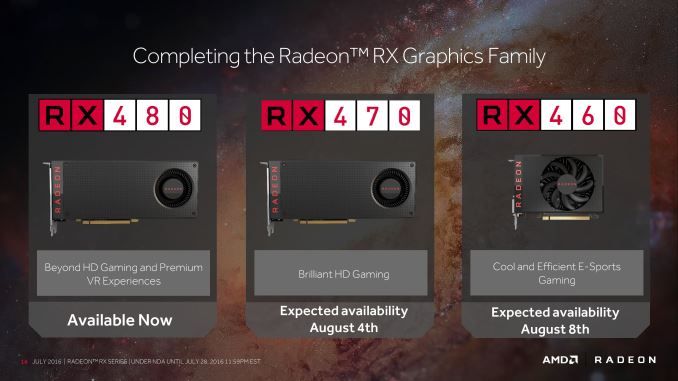AMD's entry-level RX 460 and RX 470 will launch in early August

For those interested in VR, AMD is offering the $200 RX 480, but if you're in the market for an affordable card for single-monitor 1080p gaming, the upcoming RX 470 or the RX 460 may be more to your liking. The entry-level cards are based on the 14nm Polaris architecture, with the RX 470 offering 4.9 teraflops of performance and the RX 460 up to 2.2 teraflops. To put things into context, the RX 480 offers 5.8 teraflops of power.
The RX 470 features 2048 stream processors, 128 texture units, and 32 ROPs. You get a core clock of 926MHz and boost clock of 1206MHz with 4GB of GDDR5 memory clocked at 6.6Gbps over a 256-bit wide memory bus. The card draws a maximum of 120W, and connects via a single 6-pin connector. Display outputs include three DisplayPort ports and one HDMI 2.0 port. AMD is claiming that the RX 470 will be able to deliver 60 FPS (or more) with anti-aliasing turned on at 1080p in visually-demanding titles like Grand Theft Auto V, Rise of the Tomb Raider, and The Witcher 3.
Meanwhile, the RX 460 offers 896 stream processors, 64 texture units, and 16 ROPs. Core clock is at 1090MHz, with a boost clock of 1200MHz. The card will come in variants with 2GB or 4GB of GDDR5 video memory clocked at 7Gbps over a 128-bit wide bus. The card draws less than 75W of power, and comes with one DisplayPort, one HDMI, and one DL-DVI-I port. The RX 460 is targeted at the eSports market, with AMD claiming that the card will deliver over 90 FPS in titles like Counter-Strike: Global Offensive, DOTA 2, League of Legends, and more.
AMD hasn't divulged pricing information, but both cards will be lower than the $200 starting price of the RX 480. The RX 470 will make its debut on August 4, and the RX 460 will be available starting August 8, which is when we'll know more about the pricing.
Get the Windows Central Newsletter
All the latest news, reviews, and guides for Windows and Xbox diehards.

Harish Jonnalagadda is a Senior Editor overseeing Asia for Android Central, Windows Central's sister site. When not reviewing phones, he's testing PC hardware, including video cards, motherboards, gaming accessories, and keyboards.